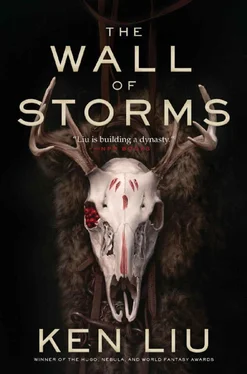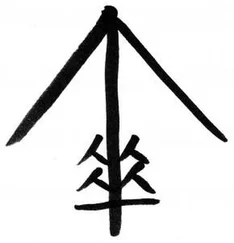In one sat Pékyu Vadyu, also known as Tanvanaki, Ruler of Rui and Dasu, Protector of Dara, Consort of Emperor Thaké.
In the other sat Empress Jia, Regent of Dara.
The summit here in the air had been Tanvanaki’s idea. Up above the surface of the sea, she was free from the worry that the crafty people of Dara might try to attack her with a mechanical cruben. Besides, both sides would be able to see far and assure themselves that no massive fleet was being readied just out of sight, ready to seize either of the leaders as a hostage.
“You’re demanding tribute,” said Empress Jia. Her tone was calm; the Lyucu gambit wasn’t a surprise to her. After the mess Pékyu Tenryo had made of Rui and Dasu, they were without adequate supplies to feed the population through the winter.
“Think of it as trade, if that makes you feel better,” said Pékyu Vadyu. “You’re paying us food and clothing in exchange for us not vanquishing you immediately like the locusts that you are.”
“That’s a rather empty boast, considering how poorly you did the last time you tried to carry out your threats,” said the empress.
“We still have more than twenty garinafins,” said Pékyu Vadyu. “And our fleet has been strengthened by Noda Mi, who’s probably the only wise man who once served you. We were merciful the last time and stopped at the moment of our victory. Do you really want to press your luck?”
Jia sighed inwardly. Superficially, the Battle of Zathin Gulf was a great Dara victory, and that was how it was being spun by Prime Minister Cogo Yelu and Consort Risana. But everyone who had a full picture of the strategic situation knew that it wasn’t so clear who was the winner.
Prince Phyro was agitating for war and vengeance for his father, but both Jia and Théra—now Empress Üna—understood that peace was the only realistic option for Dara at the moment. True, the Lyucu were running out of supplies, but Dara was in even worse shape: They had lost all the Imperial airships; the treasury was all but empty; nobles and merchants were grumbling about the long, drawn-out war harming their business interests; the College of Advocates was criticizing the war as not being within the core interests of the intellectually elevated classes; scholars seemed more interested in censuring Emperor Ragin’s unorthodox choice of a woman as heir, which broke all their treasured traditions and beliefs, than the Lyucu threat; and worst of all, Marshal Gin Mazoti was dead, and there was no tactical mind in Dara capable of replacing her.
In addition, Kuni Garu’s final decree was not witnessed by all, and there were whispers that Empress Jia was holding on to power as regent illegitimately. Empress Üna’s and Emperor Thaké’s competing claims to the throne generated heated arguments and debates among the literati and the noble families, and Jia knew that the apparently intellectual arguments were really disguised attempts to pressure her and Théra to grant more concessions to certain factions.
It’s hard to get a free people to go to war, Jia reflected. Too many interests to balance. Too many selfish desires to satisfy.
“We accept your terms”—Empress Jia said—“only if you pledge not to wage war against Dara for ten years.”
“Only if you continue our ‘trade,’ ” said Pékyu Vadyu. “And the amount of grains, feed, gold, and silk shipped to us shall increase by a tenth every year.”
“That’s robbery!”
Pékyu Vadyu grinned. “Our reinforcements will arrive in a few more months. I can promise you that these are the best terms you’ll ever get. Do not try our patience.”
Next to Jia, Zomi Kidosu, now the new Imperial Farsight Secretary, whispered into Jia’s ear, “The people of Rui and Dasu will starve if we don’t send them the tribute the Lyucu require of us. For their sake, we have to accede.”
Jia sighed in her mind. There was truth to Zomi’s words. The Dara war locusts, after all, were partly responsible for the lack of provisions on Rui and Dasu.
Empress Üna had recommended Zomi for Rin Coda’s old post and suggested that its responsibilities be expanded. Not only was Zomi in charge of intelligence gathering, but she was also responsible for coordinating research in the useful arts with the Imperial laboratories in Ginpen and analyzing economic and political trends so as to advise the court on looming threats. A true “farseer,” as Théra put it.
Jia nodded reluctantly. She was sure that the Lyucu couldn’t be trusted to keep a nonaggression treaty for ten years, but she really had little choice. “We agree to your terms,” the empress declared.
“Your adviser is clearly very wise,” said a smiling Pékyu Vadyu. Zomi, startled at being acknowledged, pulled back into the shadows of the gondola.
“I believe our business here is concluded,” said Jia stiffly.
“Just one more thing,” said Pékyu Vadyu. “As a token of your good faith, I would like you to leave behind all the jewelry you are wearing on your persons.”
Jia’s eyes flashed with anger. “What kind of nonsense is this?”
“Consider it an advance payment,” said Tanvanaki, her tone insouciant. “I still need to convince my thanes that this peace is in our interest; a gift from you would greatly enhance my rhetoric.”
Zomi and Empress Jia stared at each other.
Interesting, Zomi mouthed. Perhaps Tanvanaki’s position among her people isn’t quite as secure as we thought.
Jia nodded. This demand for jewelry might be some kind of ritual humiliation of an opponent that will serve to shore up her support among the unruly thanes. We can play along—and find out more later with spies.
“I will accede to this outrageous request,” said the empress. “But do not view it as a gesture of submission.”
“Of course not,” said Tanvanaki. “I’ll think of it as… a gift from my mother-in-law.”
Gritting her teeth, the empress took off the coral pins in her bun, letting her long curly tresses fall around her face; she removed her jade earrings and cowrie shell necklace; she even took off the dandelion pins on her robe. All these she placed in a tea platter and handed over to the Lyucu pékyu on the end of a long bamboo stick that bridged the gap between their ships.
“Tell me, as a good friend should,” said the pékyu, “where each piece comes from. After all, I would like to describe them accurately.”
The empress complied, explaining the origin and meaning behind each item.
“And your adviser, too,” said Tanvanaki. “I want everything she’s wearing as well.”
Startled, Zomi’s hand flew to the string of zomi berries around her neck. “I wear this in memory of my teacher, Luan Zyaji—who you murdered.”
“What are those beads made from?” asked Tanvanaki. “Are they corals?”
“No, these berries were discovered by him on Crescent Island, and he named them after me. Please, these have no value except sentiment. I beg of you to let me keep them.”
Pékyu Vadyu laughed and shook her head. “Luan could have been a valued member of my staff. It’s too bad he couldn’t understand the shifting winds of power, despite his learning. Are you really willing to jeopardize a peace because you can’t let go of a few berries? You’ll always have your memories.”
Numbly, Zomi released the string of berries from around her neck and watched as the empress handed them over to the pékyu through the air.
“My son is a foolish child, but gentle-hearted.” The empress could not stop herself from saying one last thing. “Whatever political games you wish to play, please be kind to him.”
“Farewell, Empress of Dara.”
The doors of the gondolas closed, and the two airships departed for their respective homes.
Читать дальше












